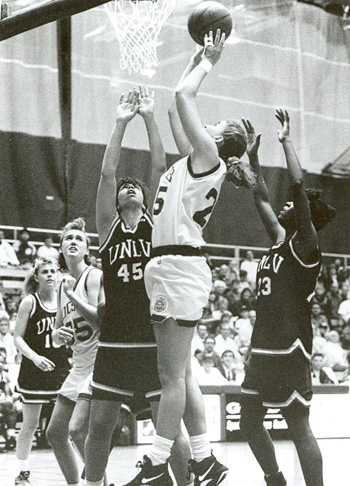Kids who commit a lane violation are getting another shot thanks to Christa Gannon.
Top-of-the-heap graduates from Stanford Law School generally have a fast-pass to the most glamorous and lucrative of legal careers, but the former UCSB basketball standout has taken her all-star credentials to one of the most overlooked and desperate sectors of the judicial system — juvenile justice.

Photo courtesy of UCSB Athletics
Gannon, a member of UCSB’s first Big West championship team in 1992, will be the keynote speaker at Monday’s annual Santa Barbara Athletic Round Table Women in Sports Luncheon, held at Earl Warren Showgrounds at 11:30 a.m. After that, she’ll speak at UCSB’s Corwin Pavilion at 7 p.m., all in celebration of National Girls in Women and Sports Day. The luncheon’s main sponsor this year is, once again, Community West Bank.
The origins of her blossoming non-profit program, Fresh Lifelines for Youth (FLY), stem from her days as a law student working with kids in maximum security at the Santa Clara County Jail.
“Many of them were facing lengthy sentences, and their faces and voices haunted me. They were saying ‘if only somebody had cared about me,'” she recalled.
FLY cares.
Founded by Gannon in 1998, FLY works with at-risk teens to educate them about how to make good life-decisions. Many of the teens are referred to the program by probation officers. FLY focuses on three different programs.
The first is a law program which educates the youngsters about the legal process and consequences of crime. It involves weekly two-hour interactive sessions featuring police officers, judges, etc… to give the teens an idea of what a life of crime can lead to. Volunteers extend the program by taking the teens home and giving them more one-on-one attention. Halfway through the program, field trips are taken to universities, graduate schools and law schools.
“In most cases, they’ve never completed anything and had something like a graduation, so we have a big celebration ceremony at the end,” said Gannon.
The second program involves individual mentoring by college students, law students and others who are thoroughly screened and trained. The program focuses on youth facing issues of drug or alcohol addiction, and includes having the mentors being there in times of need as well as guiding the youths on field trips and recreational activities.
The third part is Leadership Training, which provides an opportunity for graduates of the other two to give back in a year-long program which focuses on education and community activism.
“What we really need to do is increase visibility for juvenile justice,” said Gannon.
FLY runs on government grants, foundations and individual donors, and currently works with 3,000 youths per year in the San Jose area using 23 employees and 90 volunteers.
But how did Gannon’s career as a Gaucho hoopster direct her towards this process?
“That’s a good question, because basketball really hasn’t come up in my professional life other than the fact that I’m 6-foot-2,” she said.
But she says coach Mark French’s emphasis on having players give back through coaching kids in the community gave her perspective on the importance of community service.
“We used to love to hate our required Saturday morning Gaucho camps where we would be coaching kids and then going to practice,” she said. “But when you’re serving in the community it’s all about teamwork, and now I really work with the underdogs. One year we started off 0-7 and people wrote us off. We had to learn how to face doubt head on and not succumb to it.”
As far as how it all relates to being a female athlete, it comes down to balance for Gannon.
“I think the beautiful part about being a female athlete is that you get the opportunity to balance being a hard, tough, assertive person without sacrificing femininity and compassion,” said the mother of two, who said balancing her immense workload while also being a parent is a challenge in itself.
There will be hundreds of young female athletes present on Monday to hear her story, and hopefully follow her lead.
